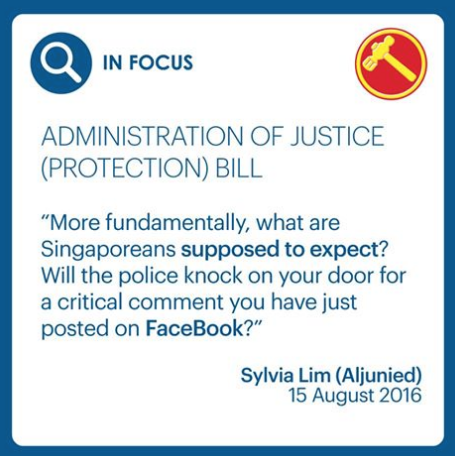Singapore passes contempt of court law amid much controversy

The Singapore government has gone ahead to pass a bill that details what constitutes contempt of court, despite strong criticism that the law serves as a way to "muzzle" public discussion and stifle freedom of expression.
The Administration of Justice (Protection) Bill was passed in parliament Monday after a seven-hour debate that saw members of opposition party, The Workers' Party, arguing against the need for such laws.

(Source: The Workers' Party)
The bill pushed key elements of the law of contempt into statute, mainly, around prejudicing court matters, disobeying court orders, as well as scandalising the courts. Contempt previously was determined by case law and not deemed a criminal offence.
With the new bill formalised, publishing material deemed to interfere with ongoing court proceedings could be considered contempt. This could include posting comments publicly on social media platforms such as Facebook or Twitter.
If found guilty, offenders face fines of up to S$100,000 and imprisonment of up to three years. Previously, no penalties were formally established.
The new law further states that statements made "on behalf of the government" about subject matters or issues in an ongoing court case would not be considered contempt of court "if the government believes such statement is necessary in the public interest".
Outlining her party's objection, The Workers' Party Chairman Sylvia Lim said in parliament that the new bill was a way to muzzle discussion on pending court cases, "while giving the government immunity to say what it deems fit however prejudicial".
"In our view, and contrary to what [Law Minister K. Shanmugam] asserts about protecting the common man, this bill will protect the ruling elites, at the expense of ordinary citizens," noted Lim, who is a trained lawyer.
The Member of Parliament took issue with exceptions to sub judice contempt provided to the government, questioning the validity of such allowances. She pointed to two previous instances during which Shanmugam had commented on ongoing court cases, while criticising others for doing likewise. She added that under the new law, the government would be the sole judge of what it believed to be statements that could be made.
Lim further expressed concern that the bill would better enable the police to investigate and arrest potential offenders. "More fundamentally, what are Singaporeans supposed to expect? Will the police knock on your door for a critical comment you have just posted on Facebook?" she questioned.
She highlighted a recent incident where several police officers raided the home of a political activist under investigation for breaches of the Parliamentary Elections Act for postings on her personal Facebook page. "Such a spectacle, if applied to this bill, will clearly have a chilling effect on public discourse," she added.
The Workers' Party Assistant Secretary-General Pritam Singh, also a lawyer, noted in his parliament speech that the bill afforded powers to law enforcement officers to confiscate personal computers, amongst other items. He added that the law appeared to specifically target civil society activists who were unafraid to challenge the government.
'Proceeding on this course will not only compromise trust between the government and people in the long run, but between the people and the police as well," Singh warned.
Minister: Public discussion not all prohibited
In his response, the law minister said the public could still express their views or criticise a judgement, as long as they did not question the integrity of a judge. The new bill, Shanmugam said, was not intended to prevent public discussion on policies or what local laws should be.
He added the bill made it easier to enforce court orders and established maximum penalties for contempt of court, where these were previously limitless. The minister also said comments made on Facebook and local bloggers were unlikely to be deemed contempt of court, noting that previous rules on contempt of court had remained unchanged despite the new bill.
He further refuted suggestions that the law was aimed at stifling free speech. "It doesn't really affect what [the public] can do or what they have been doing, unless they want to think in terms of going public and attacking witnesses and judges, and trying to get certain results from the court," he said.
The minister also had said that the bill was aimed at clarifying processes and that the law remained largely the same. Asked how it would impact foreign media and netizens, Shanmugam reiterated that the bill did not create new law of contempt but "crystallises current legal position". "If you look at our judiciary, it's held in high regard, both domestically and internationally," he said. "Whether it's foreign media or local media or netizens or online, the law applies equally to all."
In a Reuters report, the British High Commission called for Singapore to abolish laws that were similar to its "Scandalising the Judiciary" act, which Britain had abolished in 2013 because it was "unnecessary and incompatible with freedom of speech".
The report also quoted lobby group Human Rights Watch to say that the Singapore bill was "overly broad" and penalties "disproportionate".